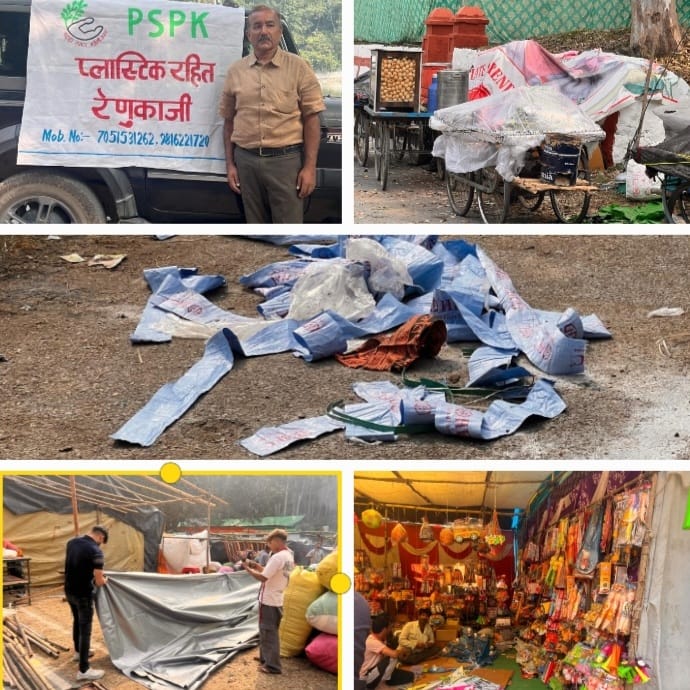Renuka Ji /Shimla: For the first time, the Renuka Ji Festival is setting its sights on a plastic-free celebration.
Thanks to the Pahari Samaj Paryavani Kawach Foundation (PSPK), this much-awaited cultural event—scheduled from November 11 to 15, 2024—aims to become a model of eco-conscious festivity.
Held near the serene Renuka Lake in Sirmaur District, the festival will welcome thousands of visitors who come each year to celebrate Himachal’s rich traditions.
This year, however, PSPK’s efforts to curb plastic could set a powerful example for other big fairs, like Kullu Dussehra and Mandi Mahashivratri.
Plastic Trouble on the Horizon
PSPK’s early review of festival preparations raised some serious concerns. Plastic use was everywhere, creating a risk that Renuka Ji could gain the ironic label of the “Plastic Fair.” Here’s what PSPK found:
- Vendors Overusing Plastic: Many vendors, especially those from outside Himachal, rely heavily on plastic for packaging, carry bags, and even stall construction.
- Environmental Hazard: Harmful materials like Alang plastic are commonly used, putting the local ecosystem at risk.
- Plastic in Essentials: From food packaging to decorations and Prasad packets, plastic’s presence is overwhelming, threatening the festival’s green goals.
PSPK’s Green Action Plan
Determined to change this, PSPK’s CEO, Major General Atul Kaushik (Retd.), has spearheaded a series of initiatives. The foundation has rallied local communities, college students, and volunteers to get involved.
PSPK’s plan includes:
- Awareness Campaigns: PSPK is hosting workshops to educate vendors and visitors on the harm plastic inflicts on the environment.
They’re also handing out pamphlets with eco-friendly alternatives.
- Clean-Up Drives: Volunteers are conducting regular clean-ups, focusing on collecting plastic waste and promoting responsible disposal. PSPK is setting up special recycling and disposal stations.
Signs around the festival grounds will declare Renuka Ji a “plastic-free spiritual center.”
Speaking on the initiative, Major General Kaushik emphasized, “We want Renuka Ji to set an example, not just for our local community but for every major festival in Himachal Pradesh".
"We believe a plastic-free event is not only possible but essential for the health of our environment.”
Facing the Challenges
Despite PSPK’s efforts, CEO Kaushik acknowledges there are still hurdles ahead:
1. Vendor Resistance: Many vendors argue that switching to plastic alternatives is too expensive and inconvenient.
2. Visitor Awareness: The large crowd could make it hard for awareness campaigns to reach everyone.
3. Limited Waste Management: The Renuka area lacks a strong recycling setup, which could affect the festival’s green mission.
“We’re aware of the challenges, particularly with waste management infrastructure and ensuring visitor compliance,” Major General Kaushik added.
“But we’re determined to push through and prove that a clean, sustainable festival is achievable.”
Recommendations for a Sustainable Future
PSPK has suggested a few steps to help the festival truly embrace its plastic-free vision:
- Vendor Incentives: Offering discounts on stall fees for vendors who use biodegradable materials.
- Media Visibility: Using social media to spread the word about the festival’s plastic-free mission.
- Partnerships: Working with local authorities and environmental groups to improve waste management.
- Post-Festival Review: PSPK plans to conduct a full environmental assessment after the event to identify areas for improvement in future.
Looking Ahead to a Greener Festival
As the Renuka Festival 2024 draws closer, PSPK’s mission to create a plastic-free celebration is bringing new energy to this cherished event.
Renuka Ji could become a shining example for other festivals to follow.
With PSPK, the community, and vendors joining hands, this celebration has the potential to honor its cultural roots while setting a standard for environmental care.
Will Renuka ji festival committee pay heed to PSPK's initiative? Will Pollution Control Board spare its inspector to check on how to keep track record of the polluters?



